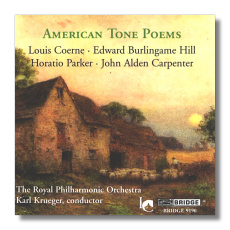
The Internet's Premier Classical Music Source
Related Links
- Latest Reviews
- More Reviews
-
By Composer
-
Collections
DVD & Blu-ray
Books
Concert Reviews
Articles/Interviews
Software
Audio
Search Amazon
Recommended Links
Site News
 CD Review
CD Review
American Tone Poems

- Louis Adolphe Coerne: Excalibur, Op. 180
- Edward Burlingame Hill: Stevensoniana Suite #1, Op. 24
- Horatio Parker: A Northern Ballad, Op. 46
- John Alden Carpenter: Sea-Drift
Royal Philharmonic Orchestra/Karl Krueger
Bridge 9190 ADD 65:48
Bridge Records' long-running partnership with the Library of Congress has allowed the release of many fine live recordings associated with that institution's concert hall. But that's not all. The Library houses other sound documents of historical importance, including recordings originally made for The Society for the Preservation of the American Musical Heritage. LP collectors will remember the name of Karl Krueger (1894-1979), a Kansas-born conductor who founded the Society in 1958, and who made several recordings of American orchestral music for the Society's label with the Royal Philharmonic Orchestra.
We have to remember that the recording industry's dedication to American music has been a sometime thing. Today, we are in danger of being spoiled by Naxos' "American Classics" series, and by the ongoing activities of New World Records. In the 1950s, Mercury was recording Howard Hanson and the Eastman-Rochester Orchestra in some of this repertoire too. In the 1960s, however, it seemed that Americans were in danger of forgetting about much of their own classical heritage (although contemporary composers were doing well enough). Krueger and SPAMH worked to fill in some of the gaps by recording music by Edward MacDowell, William Grant Still, Amy Beach, and others, including the four composers represented on this CD reissue: Louis Coerne, Edward Burlingame Hill, Horatio Parker, and John Alden Carpenter.
This CD of "American Tone Poems" might be subtitled "Society for the Appreciation of Delius," because that English composer flits in and out of all but Coerne's work. In the case of Sea-Drift by John Alden Carpenter (1876-1951), the propinquity is even more striking, because Delius actually wrote a work of his own called Sea-Drift. (Both are based on the poem by Walt Whitman. Delius set the text for soloist and chorus, while Carpenter's work was merely inspired by Whitman's poem.) Carpenter wrote short orchestral works which alluded to jazz, but Sea-Drift is late Romanticism of the purely European variety. Carpenter captures the poem's mood of love and loss perfectly.
Horatio Parker (1863-1919) is remembered primarily as Charles Ives' mystified teacher at Yale. (The other three composers were Harvard men.) Parker's music was as thoroughly conservative as his teaching, but there's no harm in that, and A Northern Ballad is one of his most enduring works. If there's a program to the Ballad, I am unaware of it, but it seems to be inspired by Parker's love for ancient Celtic and Nordic stories. Again, if a listener didn't know better, he or she might guess that this was an unfamiliar work by Delius. It's interesting stuff.
As befits its subjects – poems taken from Robert Louis Stevenson's A Child's Garden of Verses – the Stevensoniana Suite #1 by Edward Burlingame Hill (1872-1960) is more straightforward, both in terms of harmony and construction. The four movements are March (based on Stevenson's "Marching Song"), Lullaby ("The Land of Nod"), Scherzo ("Where Go the Boats"), and "The Unseen Playmate." Hill's response to these poems is gentle, even wistful – there's little childish play here, except as viewed through the eyes of a composer whose own childhood is past.
Today, Louis Coerne (1870-1922) is almost completely unknown. Like Carpenter and Hill he was a pupil of John Knowles Paine, and he also studied with Rheinberger in Germany. Excalibur obviously is based on the Arthurian legends. Instead of telling a story, the music seems to be painting a series of impressions… very colorful ones, too, that look back to Liszt's tone poems, and also (at times) suggest the film scores of Korngold. It's not a great piece of music, but it's enjoyable.
More recent recordings of A Northern Ballad and Sea-Drift probably are preferable to Krueger's. (I don't think there are other recordings of Excalibur or Stevensoniana.) Krueger is atmospheric but not very dynamic. Furthermore, some of the RPO's playing is under par (try the suspect intonation of the violin solo near the end of Excalibur), and the original recordings are showing their age, despite efforts to clean them up for CD. (There are a few signs of damage to the master tapes.) Still, there are many collectors who will want to replace their SPAMH LPs with these reissues - Bridge has three other titles in this series – and Krueger deserves to be recognized for services rendered to older American music in the 1950s and 60s. This is a worthwhile project.
Copyright © 2006, Raymond Tuttle




















